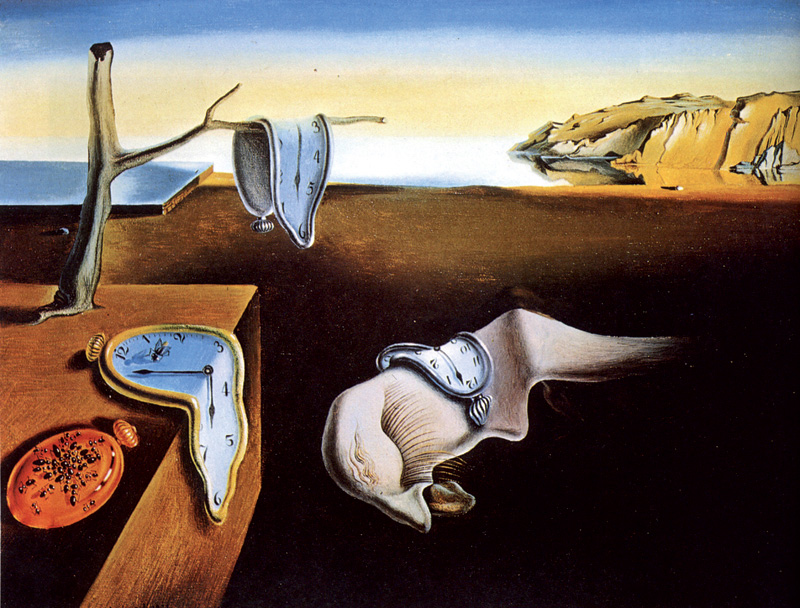Society
Environment
Politics
Economy
Culture
Basque language
Feminism
Education
International
Opinion
thursday 26 december 2024
Automatically translated from Basque, translation may contain errors. More information here. 
How do I adapt to the change of time?

Salvador Daliren memoriaren persistentzia koadroa
In some countries it is customary to change the time in order to save energy, therefore, for economic reasons, or simply to adapt and modify the calendar time at the start of a new station. But also when a person travels from one continent to another, there is a change of time that affects the person's biological cycles. The latter phenomenon is called jet lag or time zone syndrome.
According to neurologists, physiologists and other experts, our body takes a while to adapt to the time changes that occur for any reason: only one day sometimes, but in the hardest cases it takes up to five days. And although sometimes this adaptation process goes unnoticed, there are people who suffer from general malaise, tiredness, lower performance at work, lack of desire for nothing, irritability, insomnia or insomnia, concentration problems, attention or memory, mood changes, depression, digestive disorders, daytime decrease and nocturnal increase in appetite...
Symptoms are usually more severe in children and the elderly, and those with neurological disorders, such as migraine or epilepsy, to name a few, will experience a worse and more intense adaptation period.
Sync your internal clock
In order for our internal biological clock to adapt to the change of time, experts recommend following the following directions:
- A few days before the weekend in which it is time to change, we should bring our usual routines forward about ten minutes a day, especially those related to food and sleep.
- During the three days after the change, she sleeps at night and does not nap despite having sleep or sleep to avoid changes in the cycles of sleep and fatigue.
- Exposure to natural light and physical exercise in the early morning are also very beneficial to facilitate the adaptation of our body.
- Good hydration relieves fatigue and reduces dissatisfaction.
Everyone lives in their own way
However, as with any other change, the symptoms and reactions are very different among people, as well as the effects that this change can produce in our daily life, as the intensity of the time change is not the same level in all types of profession, neither in all ages, nor in all social situations.
Most read
Using Matomo
#1
Xabier Letona Biteri
#3
#4
Xabier Letona Biteri
#5
Gorka Peñagarikano Goikoetxea
You are interested in the channel: Osasuna
2024-12-12
Leire Ibar
Judge closes investigation of Osakidetza's opposition leaks without guilt
Judge Blanca Ester Díaz Pulido has completed her investigation into the leaks of Osakidetza's opposition in 2018, after six and a half years of hearings. All defendants have been acquitted in total, a total of 22, even though two of the cases have been provisionally filed.
2024-12-11
ARGIA
The Government of Navarra advocates changing the law so that the health system does not fail
The Health Advisor of Navarra has defended the need to amend the Health Law and turn it into a public enterprise entity such as Osasunbidea, otherwise "the system will not fail". Trade unions do not agree with this formula.
2024-12-05
Julene Flamarique
Every year 30-40 new cases of AIDS are detected in Navarra
The Director General of Health of Navarre has underlined the importance of making these diagnoses earlier so that there is no less contagion in the Foral Community. The Department of Health has focused on “people with the greatest difficulties in accessing the health system”... [+]
2024-12-04
Urko Apaolaza Avila
Tunagate: Do you want some mercury with the salad?
The population is excited by the amount of mercury found in tuna cans. According to a study carried out in Europe by Bloom, Carrefour, Intermarché, Mercadona, Aldi... all supermarkets market contaminated tuna. Industrial fishing has quickly underestimated these data. And that... [+]
2024-12-04
Mikel Garcia Idiakez
Feeling of guilt in perinatal death
The daughter of AMETS Etxeberria, Aduna, died in the seventh month of pregnancy as a result of a long illness. In these cases, the feeling of guilt is the weight many women carry on their backs, which also makes grief difficult. Etxeberria says that the treatment you receive... [+]
2024-11-28
Leire Ibar
Consumption of anxiolytics and antidepressant medicines increases considerably among young people
The mental health of the young people of Hego Euskal Herria is in a "worrying" situation, according to a report prepared by the digital portal Gurea Geroa. According to the survey, half of the young people suffer from emotional distress and nearly six in ten people have had... [+]
2024-11-28
Urko Apaolaza Avila
"Petronor uses the word transformation, but we only see job destruction"
Petronor workers have enjoyed a day of free struggle this Thursday. Convened by the Works Council, they have held a strike and have concentrated on the BEC of Barakaldo, where the company held its annual meeting. They have denounced that, despite receiving public money, the only... [+]
2024-11-27
Estitxu Eizagirre
Cosmetics with medicinal plants
How to wash and care without contaminating the body and the Earth?
Skin is not a superficial issue, but a limit to the outside and the protection of ourselves. However, if we use industrial cosmetics, our body introduces chemical toxins into the skin and when it moves through the hole in the shower, we contaminate the water and the Earth every... [+]
2024-11-15
Gorka Peñagarikano Goikoetxea
Claims to Osakidetza grow by 20% over the past year
Complaints and acknowledgements have remained similar, but there is a difference in complaints. For example, compared to the previous month of June this year, claims have increased by almost 30%.
2024-11-15
Gedar
Outrage at Cruces Hospital in the week of the Joint Commission audit
During this week, the United States audit will be at Cruces Hospital, which grants accreditation to health centers that meet their standards. Osakidetza has spent EUR 106,843 seeming before him.
2024-11-15
Olaia L. Garaialde
"Instead of patenting menopause, we have to live as part of a stage."
Physio Juncal Alzugaray Zurimendi, a specialist in sexology and pelvic floor, has given some keys to better understand climacteric and menopause.
2024-11-14
Urko Apaolaza Avila
The Silicosis Epidemic: Cases Multiply by Artificial Stone for Cooking
Cases of lung cancer and diseases caused by silica dust have not stopped in recent years. They have jumped alarms in Australia, England or the Spanish State, and they have begun to take steps to ban the manufacture of quartz kitchen tables with crystal silica.
Eguneraketa berriak daude











.jpg)










